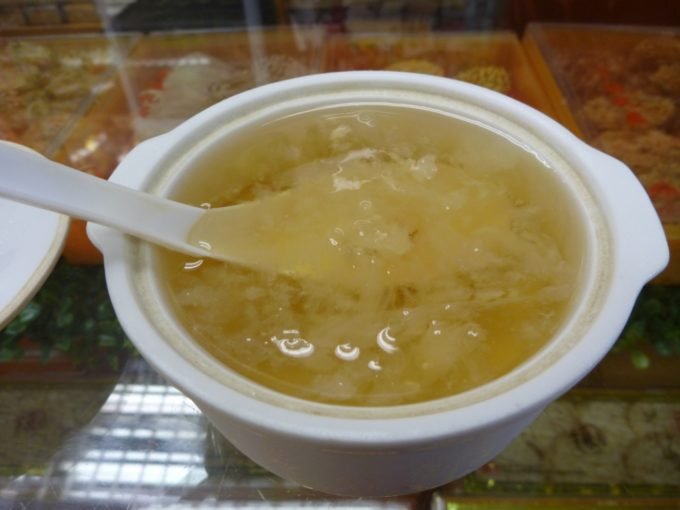
It’s Good For You, Plus It’s Really Damn Expensive

It’s Good For You, Plus It’s Really Damn Expensive
Bird’s nest soup and Baijiu in Zhuhai, Guangdong
God, I shouldn’t have come, I told myself in a hurried panic. What began as a pleasant enough baijiu-fueled traditional Chinese wedding quickly descended into madness as small bowls of bird’s nest soup were distributed around the table, one by one. At last, my time had come. “It’s good for you. Food and medicine are inextricably linked everywhere in China,” my new friend, Alex, insisted as he filled my bowl to the brim. “Plus, it’s really damn expensive.” I was cornered.
Bird’s nest soup is rumored to have a history that stretches as far back as the Ming Dynasty, when the admiral Zheng He was stranded on a remote Southeast Asian island without any food or water. After failing to find anything vaguely recognizable, Zheng and his troops reluctantly settled on the ovular swiftlet nests scattered around the island. Certain that these delicate, air-filled nests would offer no sustenance whatsoever, they were pleasantly surprised by how rapidly their energy was replenished. Upon returning to Chinese soil, swiftlet nests were offered to the emperor as gifts. They became a regional sensation and at the height of the Ming era, domestic supplies could not keep up with impossibly high demand. Swiftlets became a sought-after symbol of prosperity, class, and refinement. This reputation would stretch into the modern era. Much later, during the terror of Mao Zedong’s rule, the dish was banned for its decadence and association with “capitalist roaders.”
I was thankful for Alex’s history lesson; procrastination at its finest. I suggested a round of baijiu shots in a desperate attempt to distract from the scalding soup sitting in front of me. I soon regretted my decision. Though bird farmers are infamously private when it comes to their craft, one of our tablemates decided to tell me about the birds in excruciating detail. As it turns out, swiftlet nests are remarkable because the birds bind them together with saliva and pre-digested seaweed, as opposed to repurposed twigs and vegetation.
Wanting to get this over with, I impulsively went in for a bite, one that was probably far too ambitious for a first taste.
The soup itself wasn’t all that flavorful. Still, the second the spoon touched my tongue, I couldn’t help but be confused. The combination of a gelatinous, jelly-like consistency with a savory, meaty taste was unlike anything I had ever encountered. I wondered if uncooked bouillon cubes were anything like this. Individual nest strands were visible; translucent and slippery, they resembled thickened vermicelli noodles. I found myself chewing for at least a minute with each bite. Another round of baijiu shots felt appropriate.
I asked Alex why he wasn’t given a bowl. “Me? I would never,” he admitted while chuckling. “This was a lesson for you, little brother. At least your skin will look great in the morning.”